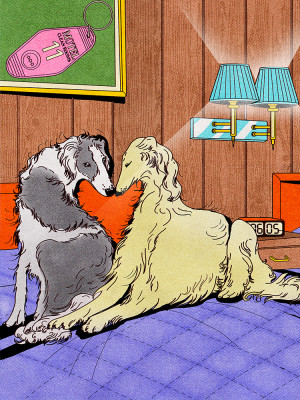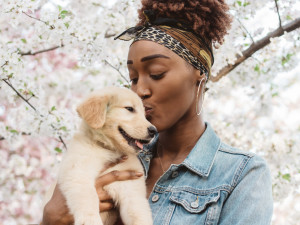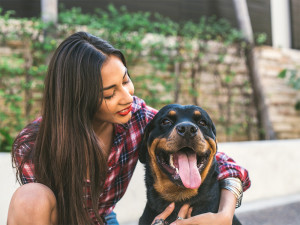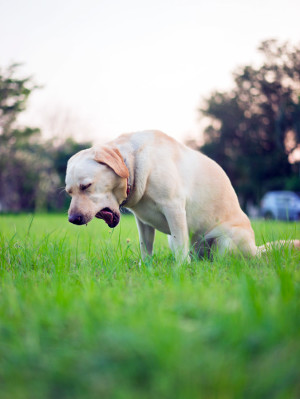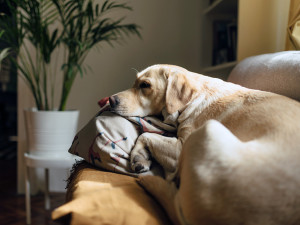Why Is My Puppy (Adorably) Snoring?
Does your adorable little pup turn into a lawn mower when they’re asleep? Find out the causes – and cures – for snoring dogs
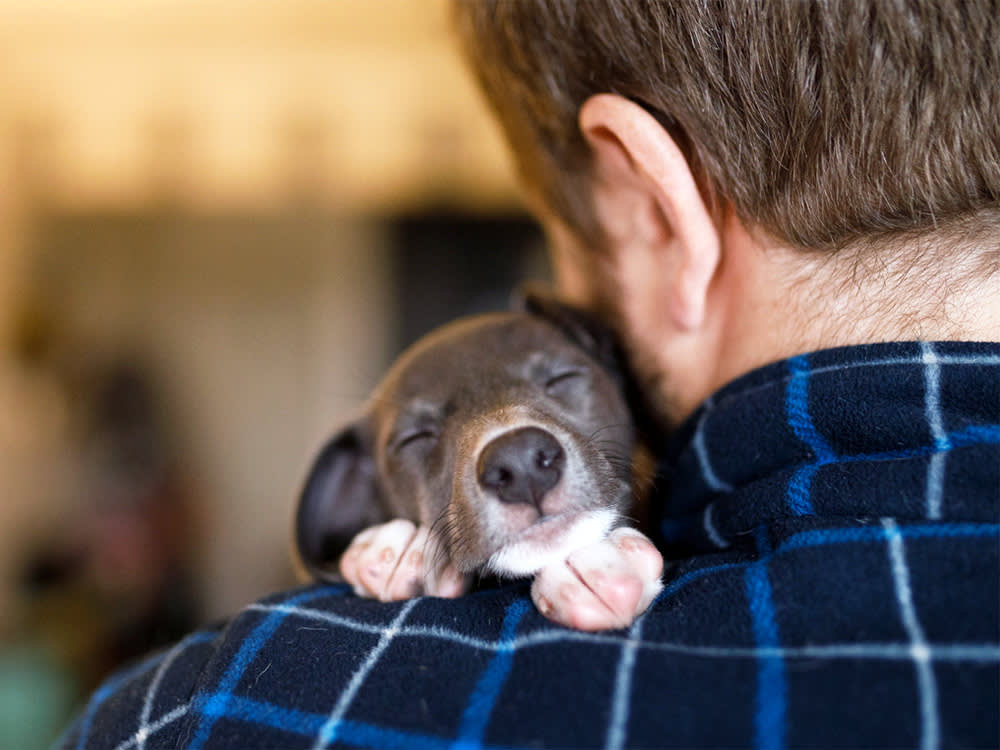
share article
Lychee, my one-and-a-half-year-old Arctic fox lookalike Spitz Klein puppy, is pretty perfect, until she goes to sleepopens in a new tab that is. What happens then you may ask? Well, about six months ago I woke in the middle of the night to a grumbling sound under my bed, my adorable pup was snoring. I didn’t panic at first but as it continued even when nappingopens in a new tab during the day, I thought I should investigate, more so to rule out any potential problems. Having spoken to a few vets, I am relieved to say nothing is wrong and I’ve now accepted her sweet grumble when in a slumber as a part of her. If your sleeping beauty is snoring, don’t see it automatically as a cause for concern as it usually isn’t, but if you are worried, it‘s always worth contacting a vet to rule out any possible underlying health issues.
Why do dogs snore?
Essentially, snoring in dogs happens when vibration is caused as air passes through the loose tissue in the back of their mouth, nose and throat. The tissue of the upper airways is relaxed as your doggy is sleeping. An increase in the audibility of the snore will happen if your dog’s airway is narrowed, which can happen because of congestion or inflammation or even an obstruction if there is something stuck there. As mentioned, it’s usually nothing but it can be indicative of something more serious like a dentalopens in a new tab abscess or hypothyroidism, so get your pup checked out if you notice the snoring becoming more pronounced.
Is it normal for dogs to snore?
On the whole, yes, it can be quite normal for a dog to snore, you may even hear excitable noises and leg or foot jerk movementsopens in a new tab, which can indicate that they are having a dream; chasing their ball, say. Dog parents would normally be able to pick up on whether their pup’s snoring is different than usual, getting much louder or has just changed because they are sleeping on their back, which allows the tongue to roll back into your dog’s throat, partially obstructing the air passage, but if you are not sure, seek medical advice.
How do I know if my dog’s snore is a cause for concern?
“I would only become worried about snoring if the owners feel like it's getting worse, or if the dog is waking up from sleep because they are not able to get enough air in due to the snoring,” says Dr Heidi Horrell, of Alma Vets in Windsor, UK. Some of the things you would want to rule out if your pup’s suddenly super-loud snoring is keeping you up at night include sleep disorders like sleep apnoea, which make it hard for the pet to breathe. If your dog’s snoring suddenly appears and is accompanied by faster breathing, panting or any other concerning behaviours, see your vet.
How can I stop a dog snoring?
One of the reasons dogs snore is being overweight, so whilst it’s tempting to treat them to their favourite titbits, don’t overdo it and monitor their weightopens in a new tab making sure it is in line with their frame and what is recommended for their breed and age. Make sure your dog gets enough exerciseopens in a new tab, which will keep them healthy and encourage a good weight, too.
Their snoring could be down to allergiesopens in a new tab, which can be caused by dust mites; so keep where they sleep, carpets etc clean. Or it could be an allergy to food ingredients, in which case it would be worth starting them on a hypoallergenic diet with your vet‘s guidance. If you smoke, stop! Or at least do it away from your dog – the toxins and chemicals in cigarettes can irritate your dog and make them more susceptible to respiratory infectionsopens in a new tab, which can also lead to snoring. Investing in an air purifier can help to alleviate any respiratory irritations or allergies and can promote clear airways. It is advisable to take your dog to a vet for at least an annual check-up to rule out anything underlying that could contribute to snoring, so you nip it in the bud as a preventative.
Prevent your dog getting a coldopens in a new tab, which can lead to snoring, by keeping them warm – especially if the house can be draughty. Make sure that you dry them well after a wet and windy walk, too. You could even look into extra bedding so they are snug and warm at night. Alternatively, if you live in a hot climate or have a hot house, your dog may be finding it hard to breathe, so make sure they have a way to cool down. Lastly, if you’ve tried everything, ask your vet about some natural anti-snoring medicine, which could be tablets or oral sprays.
Do dogs snore more as they age?
Absolutely, “Snoring also does increase with age,” says Dr Heidi. This is because their larynx muscles aren’t as tight as they were when they were younger and the thought is that looser airway muscles are what give older dogsopens in a new tab the tendency to breathe more loudly when they are fast asleep.
Are certain breeds more likely to snore?
“The likelihood of snoring be very breed-dependent. A lot of the time is has to do with the length of their soft palates, as well as their nasal turbinates. In brachycephalic breeds (flat-faced breedsopens in a new tab), it is much more common as they are predisposed to having elongated soft palates, which worsens their snoring” says Dr Heidi. In these cases, vets can perform surgery to shorten this but not necessarily for the snoring per se, instead to help with the dog’s breathing.

Yasemen Kaner-White
Yasemen Kaner-White is author of the biggest book in the world on lemons – Lemon Compendium, a seasoned travel, wellness and food writer and broadcaster, but perhaps most importantly, she is the mummy of her Spitz Klein pup named after her favourite fruit, no, not lemon – that would be a berry, but ‘Lychee’!
Related articles
![An illustration of 2 dogs on a bed]() opens in a new tab
opens in a new tabThree’s a Crowd: When One Partner Doesn’t Want the Dog in the Bed
You want them to cuddle up; your partner doesn’t. Here’s how to handle the great bed debate
![woman draped in an orange blanket holds a black-and-white puppy]() opens in a new tab
opens in a new tabPuppy Developmental Stages and Milestones
What to Expect When You’re Expecting – canine edition
![Young woman is hugging her Rottweiler dog while they sit outside on the street.]() opens in a new tab
opens in a new tabWhat to Know About Your Puppy’s Hiccups
In addition to being adorable, it’s nothing to worry about
![Labrador sitting in the grass coughing]() opens in a new tab
opens in a new tabWhat to Do If Your Dog Eats Something They Shouldn’t
Whether it’s socks, stones or an affair partner’s underpants (true story), a vet weighs in on how what to do when your dog swallows something that wasn’t on the menu
![sick dog lying on sofa]() opens in a new tab
opens in a new tabCan Dogs Actually Get the Common Cold?
You’re sneezing, blowing your nose and stocking up on Lemsip. But is your pup at risk of catching your cold?
![woman with black curly hair sleeping in bed with her long hair daschund]() opens in a new tab
opens in a new tabSafe Sleep With Your Small Dog
Is there anything better than snuggling up to your pup all night? Here’s how to do it safely
